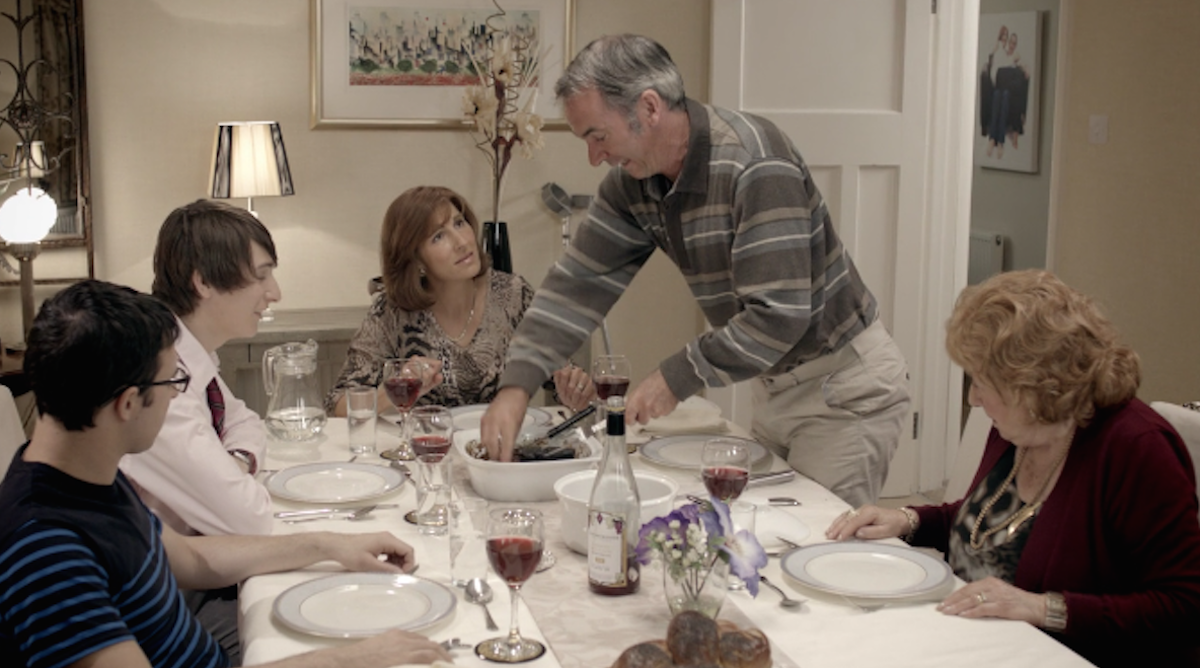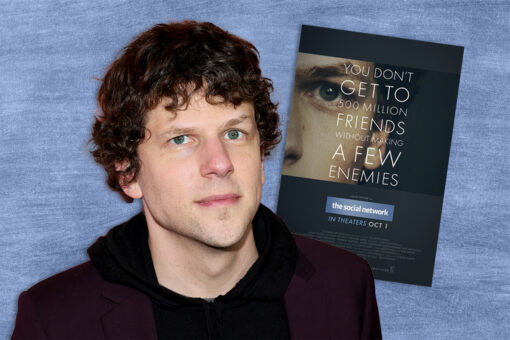Meet the Goodmans: the fictional Jewish family at the center of the British sitcom Friday Night Dinner. Purely from the facade of their modern townhome in the suburbs of North London, you wouldn’t expect much else of note than a (boring) middle class family. But their realistic portrayal perfectly encapsulates what it means to be a contemporary secular British-Jewish family.
As suggested by the title Friday Night Dinner, the show, which you can currently stream on Hulu, follows the family’s weekly Shabbat gathering. And while there’s the religious trappings of candles and challah on the table, their Shabbat observance is entirely secular. Yet, the Jewishness of the family is not erased in favor of universality (looking at you, The Goldbergs).
Friday Night Dinner is the brainchild of Robert Popper, who has worked on The IT Crowd, Inbetweeners, and South Park. The show was inspired by his own secular Jewish upbringing. Popper focuses “more on the Jewishness of the central relationships,” out of a realization that he “couldn’t work out how to make lighting the candles funny.” The show adds variety to British depictions of Jews, which Popper has described as “overdone.”
As a cringe comedy, I would describe Friday Night Dinner as a pitch perfect combination of the familial dysfunction of Arrested Development, the escalating symphony of destructive problems that is Curb Your Enthusiasm, and the farce of 30 Rock. Obviously, high praise. To spell it out, the Goodmans’ antics are as painfully awkward and painfully funny as you can get.
I can’t say when or if there will be a sixth season (or if the American version that was pitched to star Tony Shalhoub, whom we already know can play a great Jewish dad, will ever happen), but in the meanwhile, you can catch up on the Goodmans antics on Hulu, and you really should. Here’s why:
1. The characters
In many ways, this photo sums up their dynamic:

There’s the father, Martin, who’s frequently without a shirt due to that notoriously “boiling” British climate. He has a penchant for his peculiar phrases like “shit on it,” and he has both a hoarding and a hearing problem. He’s less talented in the social skills department, like the time he gave his son a book on the SS for his birthday.
Then there’s the mom, Jackie, a doting matriarch who just wants her carpet to remain clean, her homemade meal to go well, and the best for her kids (read: marriage).
Their adult children Adam and Jonny (respectively and disrespectfully known to each other as “puss face” and “piss face”) mark their weekly exodus home by pulling pranks.
2. Realistic Jewish family life
The parents frequently cross boundaries with their adult children, involving themselves greatly in their personal lives. Which, after all, is Jewish tradition. The parents set up eldest son Adam and make him go on Jewish dating websites to get “females” (as Martin calls them). All Jews of a certain age (that age being 10 seconds after your bar/bat/gender-neutral mitzvah) are familiar with the yentas who can list for you all of the romantically available Jews in a 100-mile radius.
And then there’s the time Jonny, the younger son, secretly gets a tattoo. To make matters even worse, it is a skull that says “live fast, die young” in Latin. Not only has he gotten inked (Leviticus 19:28 and Maimondes are QUAKING), but he’s combined it with a flagrant disregard of the core Jewish value of life (sorry M.I.A.) and the language of the Catholic church. Cue the collective heart palpitations of Jewish moms across the globe (can you feel it?!). Of course, this tattoo doesn’t remain secret for long. You already know there’s no stopping the yenta Jewish mom (aka the limit of nagging does not exist).
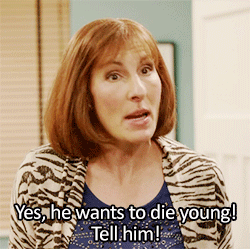
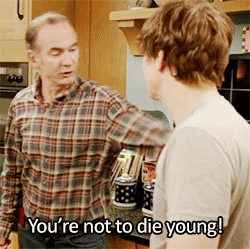
3. Messing with Jewish tradition (*insert legally required Tevye echo of “Tradition!”*)
Enter the honorable “Shabbos goy,” Jim. In actuality, he more serves to interrupt than actually help with Shabbat proceedings (not that the Goodmans actual follow Shabbat rules). Jim is strange. Really, strange is too light a word. He frequently shows up unsolicited at their door, equipped with his dog Wilson who hates him, an uncomfortable obsession with Jackie, and various absurd problems.
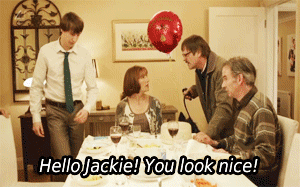
Instructionally, Adam and Jonny make up things about Judaism to tell Jim, which plays off the audience’s insider knowledge of Jewish traditions. Similarly, Jim thinks it’s Jewish tradition to throw plates against a wall (oypa!), ask about circumcisions, and perform sacrifices at temple. He also has pioneered matching yarmulkes (he calls them “hamacam” or “Jewish hats,” both of which are objectively better than when I was wearing a wrap headband in high school and someone asked if it was a “Jew hat”) by cutting them out of his own shirt. We stan a DIY queen!
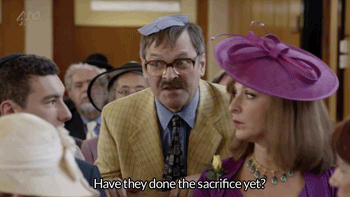
Combining Judaism’s kink for gutturals and extensive food rules, Adam and Jonny tell Jim that a “schmoigel,” a fruit basket of green fruit in which kiwis are allowed and pears are forbidden, is a traditional Jewish birthday gift.
But most important in Jim’s neo-Hebrew school education is his taught signature greeting of “shalom.” Ever the innovator, Jimbo says “shalom” with a signature tonal and drawn out flair. You’ve gotta give it to him; even in his ignorance, he’s trying.

All of this is to say, there’s something very relatable in being the unsolicited token spokesperson for people like Jim who’ve never met a Jew before.
4. A secular vignette
For the Goodmans, on their Shabbat table is the very British dessert crumble and occasionally adjacent is a Christmas tree. Yet, they still are very Jewish. Even when (no spoilers) a giant cross is erected in their yard. And even with Tom Rosenthal (who plays youngest son Jonny) being the only Jewish member of the main cast (despite the fact that Simon Bird, who plays Adam, has been described as “quite possibly the most Jewish looking non-Jew”).
We have no shortage of iconic secular Jewish American TV shows (see: Curb Your Enthusiasm, Seinfeld, Broad City, Big Mouth, Difficult People, and The Marvelous Mrs. Maisel; expanding to North America, you obviously have Schitt’s Creek as well). It’s about time we have a British one.
